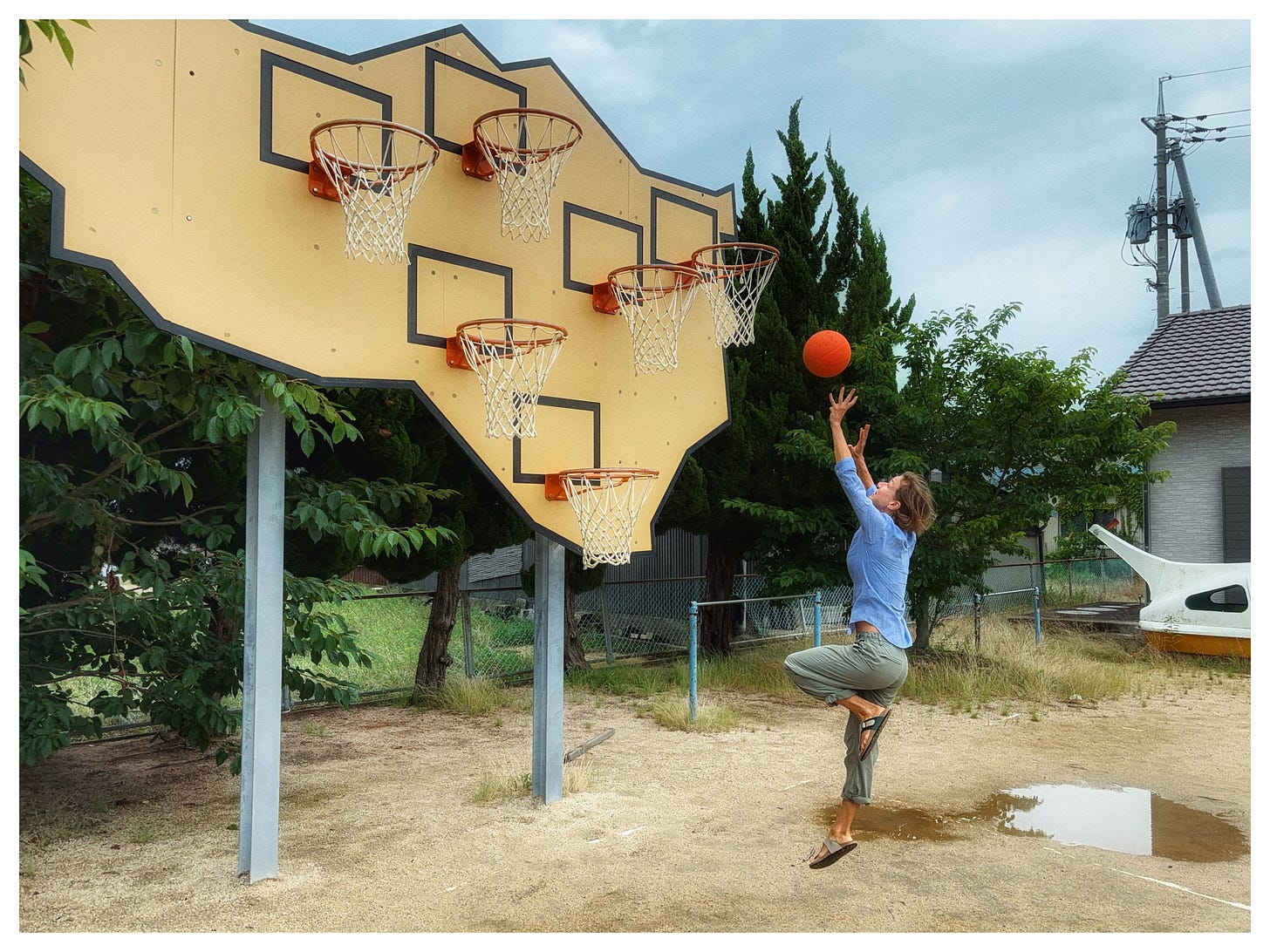🔎 How to Calm Anxiety by Learning New Languages
On cultivating curiosity, the beauty of Japanese, and having fun
The pandemic years did a number on me. Amid concerns for my health and the well-being of everyone I loved, I lost my mother to Alzheimer’s and got deeply involved in a nasty family drama concerning my in-laws.
These experiences left me battling anxiety, sleeplessness, forgetfulness, and difficulty focusing. I’d faced emotional crises before—few of us escape them in life—but never anything this destabilizing. I found myself in an unknown territory, a reluctant drifter in a foreign land.
“Mental health is a miracle we are apt not to notice until the moment it slips from our grasp at which point we may wonder how we ever managed to do anything as complicated and beautiful as order our thoughts sanely and calmly.”
—Alain de Botton in A Therapeutic Journey: Lessons from the School of Life
(I highly recommend this book!)
I used many known strategies for managing my anxiety. I went on regular walks or swam in the ocean. I intensified my yoga practice. I made lists. I tried (though ultimately failed) to turn meditation into a daily habit. I talked to friends and family members to remind myself how connected we were. I payed attention to what made me laugh and veered in that direction. I read poetry. I marveled at trees, the night sky, or the inside of a fig. I considered therapy, but taking the long waiting lists into account, I deemed my needs less urgent than others’. I did breathing exercises. I swallowed pills.
While these strategies brought some relief, none gave me the rebirth I craved. It wasn’t until the spring of 2024, when Daniel and I decided to return to Japan and I started to learn Japanese, that I found a way to restore my mental balance.
Humans are curious animals, and we love to learn
Initially, I learned Japanese for a practical reason: I wanted to communicate with Japanese people without using a language app or forcing them to speak English. After a few days of doing Japanese lessons on an app, I noticed how much I enjoyed it. Learning Japanese wasn’t a chore; it was a gift to myself. I looked forward to my daily lesson time when my mind would be absorbed in unraveling the mysteries of this beautiful language. Soon, I turned to my language app for calm: Learning Japanese became my go-to strategy for escaping my spiraling thoughts.
Unlike easy distractions that offered a temporary fix, such as scrolling social media or watching a movie, learning Japanese had a lasting impact. After focusing and cultivating my curiosity, I felt lighter and happier, as though I had rewired my brain.
The pleasure of language is everywhere
The appeal of learning a new language far transcends practical gain.
There’s…
fun in imitating strange sounds
beauty in the logic of language
joy in discovering illogical exceptions
triumph in memorizing a difficult phrase
humility in accepting inevitable mistakes
inspiration in seeing how words braid together
humor in twisting your tongue
enchantment in layers of grammatical complexity
wonder in the face of etymology
surprise in thinking of familiar objects in an unfamiliar tongue
delight in matching a native speaker’s pronunciation
pride in overcoming common blunders
creativity in speaking with limited vocabulary
and love in realizing how language connects us all.
What about multiple languages?
My success with Japanese gave me the confidence to explore other languages. This fall, I added Italian to my daily practice, and with travel plans to South America on the horizon, I’ve also started learning Spanish.
At first, I worried I would mix things up, but I’ve found it surprisingly easy to switch between the languages. It’s as though each language has its own room in my mind. When I’m in my “Spanish room,” I have a hard time accessing a Japanese word, but getting from one room to the next is simple.
Ways to learn a new language
I experimented with various methods to learn a new language. Some were more effective than others, and what worked for me might not suit everyone. Here’s what I’ve tried, and how each method has enriched my journey:
Duolingo
I began with Duolingo, though I’m not a fan of video-game-like features or cutesy sounds. However, the challenge of maintaining a streak motivated me, and for learning Japanese scripts, Duolingo was excellent—I could draw characters directly on my phone! The free version gets you a lot and the paid version is reasonably priced.
Preply
I added private virtual lessons through Preply. But talking to a teacher in their native language requires a certain level of fluency and my Japanese isn’t good enough yet to have the kind of conversations I’d like to have. So I wasted a lot of time speaking English to my teachers and asking grammatical questions I could have found the answers to online. I’ll try this again when I’m a farther advanced.
Mango
To test myself and vary things, I also practice my languages on the Mango App. I find these lessons significantly more difficult: I cannot seem to memorize things as quickly as the app wants me to. But Mango does offer grammatical and cultural insights that Duolingo lacks. (Tip: Check whether your public library gives you free access to this app.)
Text books, picture dictionaries, and grammar guides
Whenever I’m in a book store, I browse the language learning section and pick up something on my level. Seeing the language in print helps me consolidate what I’ve learned digitally.
Dual-language books
Reading in Japanese remains out of reach for now—I’ve only learned a fraction of all the kanjis—but even with my beginner’s level of Spanish, I can read short texts. I’m currently enjoying Pablo Neruda’s “The Captain’s Verses” in Spanish and English side by side.
Songs
I listen to my favorite albums sung in a foreign tongue and look up their lyrics online. Because I’m emotionally invested in these songs and genuinely curious, I seem to memorize these words quicker than if they’d appeared in a lesson.
Class room
Learning a language will be an even better experience in a live class room, because I’ll have the added benefit of meeting others and becoming friends through shared interest and vulnerability. But I don’t always live near a language school, and when I’m anxious, I’m less inclined to go out in public and interact with others. So in these cases, learning a new language on my own works out well.
Talking to locals
Immersion therapy is next on my list: I plan to stumble my way through Spanish in Ecuador. It will be embarrassing, making mistakes, misunderstanding others, asking for things to be repeated, but I find it more embarrassing to always speak English and expect locals to adapt to me.
Play
When none of the methods above appeal to me, I learn at random, following my curiosity. I translate the salt shaker on the table. I photograph kanji on the street and look up their meaning. I speak Japanese to Daniel even if he has no clue about what I’m saying. Learning a language doesn’t need to be a rational endeavor. We can approach it as play and simply have fun.
These methods not only help me learn languages, they also create moments of focus and joy, altering how I interact with the world.

There’s no easy fix for anxiety
Excessive worrying doesn’t vanish with a single solution. I still live with the ghost of my fears. There are times I obsess over things I cannot change and struggle to stay sane in the madness that surrounds me. (Such as yesterday, while I was constantly checking updates on the fires in L.A.). But learning new languages has become a lifeline, a helpful routine in managing my anxiety. It’s like exploring an exotic island, collecting samples, finding undiscovered paths— far more fascinating than my own repetitive thoughts.
If learning a new language is frustrating to you, because you’re not as quick a learner as you think you should be, or because you cannot forgive yourself for your very human limitations, or because it reminds you of school years you’d rather forget, you may want to try learning another skill. I hope you’ll find something that fully engages your mind and (more importantly) that makes you happy.
Disclaimer
This post is a reflection of my personal experiences. It’s not a substitute for professional medical advice, diagnosis, or treatment. Please consult a qualified healthcare professional for your specific mental health needs.
Related Posts
If you enjoyed this essay, you might also be interested in reading:
Time to Say Goodbye
The fires ravaging Los Angeles are shocking. Our friends are safe for now, but some of their friends had to evacuate and/or lost everything. We are scheduled to return to L.A. on Monday. We left half our luggage there and bought flights from LA to Quito later. But we’ll have to see what happens. My heart goes out to everyone in the area. May these fires die down soon!
All my best,
Claire






Thank you so much for sharing your experience with Anxiety and how you were able to some-what find relief. I too suffer from anxiety for over 20 years now. Covid has also impacted me and my kids. I lost my best friend in 2023 when she caught covid at work and after 3 weeks she passed away.. Since then, nothing has ever been the same for me. Even my daughter misses her so much because when i would meet with my best friend, my daughter would often be with me too. My best friend taught me beading. I work with small shiny, colorful beads and make bracelets, earrings, pen holders, bookmarks and more. It is a new skill I learned and even my daughter started beading as well. I find it helps calm my anxiety and I really enjoy it. However, each time I bead, I am reminded that I used to bead with my best friend which is no longer here, I remember that she taught me this amazing skill.
Great tips. I'm on a 50 day streak on Duolingo with German, but I'm going to look into the other suggestions you've made. Singing in a choir is another great way to stay focused on something meaningful!